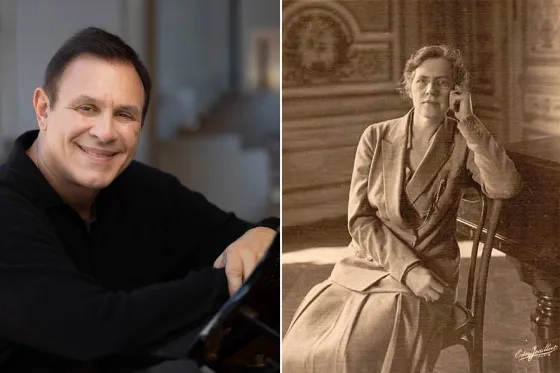What Nadia Boulanger Taught SFCM's Composition Chair About Music
News StoryComposition Department Chair David Conte was one of the last of Boulanger's students; she was also famous for teaching Philip Glass, Quincy Jones, and many others.
Nadia Boulanger is one of the most famous music teachers of all time, mostly by virtue of some of her most famous students, like Aaron Copland, Philip Glass, and Quincy Jones. But her legacy is still somewhat incalculable, given the influence of not just those students, but one of SFCM's own: Composition Chair David Conte, who studied with Boulanger near the end of her life.
"Boulanger was one of the first teachers at the French Music School for Americans at Fontainebleau, which opened in 1921," Conte says. "Copland went there to study because he was interested in Debussy and Ravel, but Boulanger was not famous in the States at all. Most composers went to study in Germany up until after the first World War, then Americans started going to France, with Copland starting the trend, particularly for composers from Harvard, including Virgil Thomson, Walter Piston, and Elliott Carter."
In 1975, while studying music education at Bowling Green State University, Conte was recommended for Fontainebleau by a professor. "I went for one summer, and then I went back and I stayed for two years," he recalls. Boulanger, who was born in 1887, died in 1979, making Conte one of the last people who studied with her. "There aren't that many of us who are really active composers who studied with her who are still here," he continues. "There are a few who are older than me, but most of her students have died."
Conte remembers his first lesson with Boulanger. "I played one of my compositions at the piano for her, and she said to me, 'Well, you're born to compose.' Now, she didn't say that I was a great composer, but she said, 'An apple tree produces apples; you will produce music.' So by the end of that first lesson, I felt welcomed by her into the fraternity of musicians. For a 19-year old, It was a very important validating experience."
Conte was part of a group of around 30-35 students at that point, and Boulanger was teaching two classes a week: her advanced keyboard harmony class, and her famous Wednesday score analysis class, which composers like Camille Saint-Saëns, Igor Stravinsky, and Sergei Prokofiev would drop in on from time to time. "Bach's Well-Tempered Clavier was always the centerpiece, but we'd also look at Beethoven sonatas, Schumann, Chopin, and a lot of contemporary music. That's how I learned about the music of Henri Dutilleux, who was between Olivier Messiaen and Pierre Boulez in age."
"Boulanger was a brilliant talker", Conte recalls. "She used to say, 'You should only go into music if you cannot live without it. Otherwise you make a mistake: You marry someone you do not love.' She had this idea of being a musician, and specifically being a composer, as a kind of consecrated activity, a true calling, a true vocation. And so it required a great deal of discipline; she'd say that 'the training of a composer is long and expensive.'" Conte added in his oral history conducted by the SFCM library that, "There were about 75 people at Fontainebleau in any given summer, and in the very first weeks all of her classes would be packed, and by the fourth or fifth week it would be reduced by half. It wasn’t that she was a tyrant, but she was very demanding and people either became tired or couldn’t keep up with her."
Conte, who has taught at SFCM since 1985, said, "I learned from Boulanger that when you teach, you're presenting information on a gradient. If the gradient of information you present is too steep, the student becomes discouraged and falls off and they give up. And so your job as a teacher is to figure out what task you can give the student that they can master and get confidence and encouragement. And you're constantly upping the stakes as the student becomes more experienced and more confident, but as Nadia used to say, 'There has to be time for true assimilation, one can't add on endlessly.'"
Boulanger's focus on keyboard skills for composers has had a lasting impact on SFCM. The Conservatory is one of the very few that require a keyboard audition as a requirement for the composition department. "Every composer has to play three pieces from memory at their audition, whether they're a freshman or a grad student," Conte says. "There's this idea that Boulanger communicated that the fingers lead the brain and the ear. If you look at the history of composers over centuries, there's very few examples of composers who weren't only very competent pianists, but outstanding ones."
In his oral history, he recalled, "The main value of her teaching was her emphasis on training the musical memory: How much music someone knows by heart, how deeply can they remember whatever choices they’re making and how those relate to the choices they’ve made before and the choices that are to come later as the piece unfolds … The only way you can have a great composer is if they focus on those things, and so that’s what Boulanger was teaching, and that’s
what I’m trying to teach."
